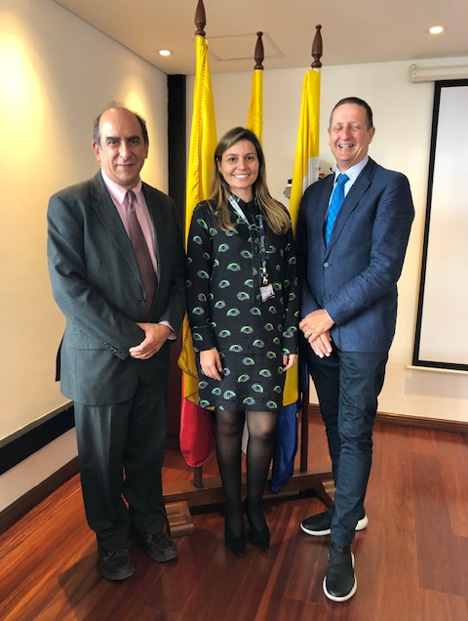Fondation Botnar supports CSART and partners to deliver a unique approach to improving young people’s mental health.



A unique approach harnessing computer simulation will test mental health solutions for young people to guide decision makers and researchers in real world settings.
Mental illness in early life can have a devastating effect on the social, family, educational and vocational trajectories of young people. This in turn impacts the future ‘mental wealth’ of nations. With more than half the world’s population now living in urban areas, decision makers, constrained by limited resources, face significant challenges to design effective mental health programs for delivery at scale.
After a rigorous review process, Fondation Botnar awarded CSART and its transdisciplinary partners CHF 1.4 million to develop an advanced decision analysis, monitoring & evaluation infrastructure to strengthen mental health systems for young people in Bogota, Colombia.
Fondation Botnar is a Swiss-based foundation which champions the use of AI and digital technology to improve the health and wellbeing of children and young people in growing urban environments. To achieve this, the foundation supports research, catalyses diverse partners, and invests in scalable solutions around the world.
The research program begins in March 2020 and continues for two years. Work will focus on bringing together the best available evidence, data, expert and local knowledge to develop an interactive decision support tool (computer simulation model). To inform strategic planning, the tool will be embedded in an ongoing monitoring and evaluation cycle – updated over time with fresh data – to ensure a robust continuous improvement framework.
CSART Managing Director and University of Sydney academic, A/Professor Jo-An Atkinson says: “We are enormously grateful to Fondation Botnar for the opportunity to demonstrate and assess the value of advanced decision support technologies that will help improve system design and resource allocation for youth mental healthcare in Bogota, Colombia. This participatory approach to operations research provides a blueprint for future applications in complex decision-making environments and resource-limited settings.”
The opportunity provided by Fondation Botnar to take our learnings and technology from Australia and work collaboratively with young people and academic partners in Colombia is both timely and visionary.
In addition to the development of a computer simulation model to inform strategic decision-making at the population level, the research program includes customisation and piloting of a youth mental healthcare coordination platform already successfully implemented by the University of Sydney, Australia. This will enable service providers to better connect and coordinate care at an individual level and better tailor services to young people.
Professor Ian Hickie, Co-Director for Health and Policy at partner institution Brain and Mind Centre of the University of Sydney, agrees: “The opportunity provided by Fondation Botnar to take our learnings and technology from Australia and work collaboratively with young people and academic partners in Colombia is both timely and visionary.”
Co-investigator Dr Laura Ospina-Pinillos, A/Professor at Pontificia Universidad Javerian in Bogota confirms: “Countries like Colombia, with limited recourses, cannot risk investing time and money into the wrong things; we need to be more assertive. Fortunately, new and innovative technologies give us that opportunity. We are very excited to be part of this project.”
The ambitious work program is made possible by CSART’s international alliance of partner institutions, home to centres of research excellence in systems modelling and simulation, data science, youth mental health, and transdisciplinary global health – namely:
- Department of Psychiatry and Mental Health, Pontificia Universidad Javeriana, Bogota, Colombia;
- Swiss Centre for International Health, Swiss Tropical and Public Health Institute, Switzerland;
- Brain and Mind Centre, Faculty of Medicine and Health, University of Sydney, Australia;
- Computational Epidemiology & Public Health Informatics Laboratory (CEPHIL), Dept. of Computer Science, University of Saskatchewan, Canada;
- School of Computer, Data and Mathematical Sciences; and the Translational Health Research Institute, Western Sydney University, Australia; and
- Faculty of Economics, Universita della Svizzera italiana, Switzerland.
Dr. Aline Cossy-Gantner, Chief Learning Officer at Fondation Botnar says: “This project tackles an area of increasing focus for us: the mental health and wellbeing of young people around the world. Led by experienced researchers, the approach – using computer simulation – embraces the opportunity Fondation Botnar sees for the role of digital to improve health outcomes. We are eager to apply the learnings from this pioneering research for broad impact at wscale.”
A/Professor Atkinson confirms: “Our team has a genuine commitment to take modelling out of back rooms into forums where it can be scrutinised by a broad range of system actors including representatives from academia, policy, planning, clinical practice, economics, private and community sectors, and people with lived experience of mental illness, to make sure models that inform decision-making are robust and credible.”
She continues: “Participatory development of computer simulation models helps build a collective understanding of what will work and what won’t to improve youth mental health in a particular context before investing time and resources; it helps us avoid unintended consequences; it helps us understand why even some evidence-based solutions don’t have the intended impacts when implemented in complex systems; and most importantly, it helps us make investment decisions that will strengthen the mental health system to improve the long-term health and wellbeing of young people.”
CSART (www.csart-world.com) is a not-for-profit organisation working to build global capacity in the use of computer simulation and advanced research technologies to support policy and planning decisions that address society’s most complex, persistent health and social problems. CSART works at the intersection of a number of science streams – computer, data, systems, health and behavioural, citizen – to offer better analytic tools into the hands of decision makers. CSART and its partners work to create the necessary workforce, technological, and systems infrastructure to make these advanced decision tools more broadly available and more routinely used.
For more information, Contact Us


